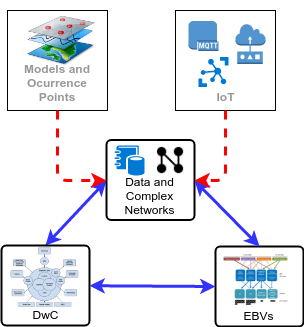|
Biodiversity Information Science and Standards : Conference Abstract
|
|
Corresponding author: Wilian França Costa (wilianfc@gmail.com)
Received: 09 Apr 2018 | Published: 17 May 2018
© 2019 Wilian França Costa, Raquel Sousa, Tereza Giannini, Bruno Albertini, Antonio Saraiva
This is an open access article distributed under the terms of the Creative Commons Attribution License (CC BY 4.0), which permits unrestricted use, distribution, and reproduction in any medium, provided the original author and source are credited.
Citation: Costa WF, Sousa R, Giannini T, Albertini B, Saraiva A (2018) New Requirements of Biodiversity Research for Metadata on Models and Sensors on the Internet of Things and Big Data Era. Biodiversity Information Science and Standards 2: e25653. https://doi.org/10.3897/biss.2.25653
|
|
Abstract
Important initiatives, such as the Convention on Biological Diversity's (CBD) Aichi targets, the United Nations' 2030 Agenda for Sustainable Development (and its Sustainable Development Goals) highlight the urgent need to stop the continuous and increasing loss of biodiversity. That requires an increase in the knowledge that will allow for sustainable use of natural resources. To accomplish that, detailed studies are needed to evaluate multiple species and regions. These studies demand great effort from professionals, searching for species and/or observing their behavior. In this case, the use of new monitoring devices could be beneficial in data collection and identification, optimizing the specialist effort to detect and observe species in-situ. With the advance of technology platforms for developing connected devices and sensors, associated with the evolution of the Internet of Things (IoT) concepts, and the advances of unmanned aerial vehicles (UAVs) and Wireless sensor networks (WSN), new scenarios in biodiversity studies are possible. The technology available now could allow studies applying relatively cheaper sensors with long-range (approx. 15 km), low power, low bit rate communication and up to 10-year battery life, using a Low Power Wide Area Network (LPWAN) and with capacity to run bio-acoustic or image processing detection. Platforms like Raspberry Pi or any other with signal processing capabilities can be applied (
Keywords
Biodiversity, IoT, EBV, Sensor Networks, Model Metadata
Presenting author
Wilian França Costa
Presented at
Oral presentation
Funding program
We are grateful to National Council for Scientific and Technological Development (CNPq) for financial support (proc. 446167/2015-0, 381626/2016-4 and 380277/2018-2).
References
-
Multiplex social ecological network analysis reveals how social changes affect community robustness more than resource depletion.Proceedings of the National Academy of Sciences113(48):13708‑13713. https://doi.org/10.1073/pnas.1604401113
-
The next generation of site-based long-term ecological monitoring: Linking essential biodiversity variables and ecosystem integrity.Science of The Total Environment1376‑1384. https://doi.org/10.1016/j.scitotenv.2017.08.111
-
The Internet of Things for Protected Areas: The Application of Innovative Technologies to Improve Management Effectiveness (First report of IUCN Mission to PNP).Smart Earth Network | Eridanis. IUCNURL: http://www.smartearthnetwork.com/pages-209
